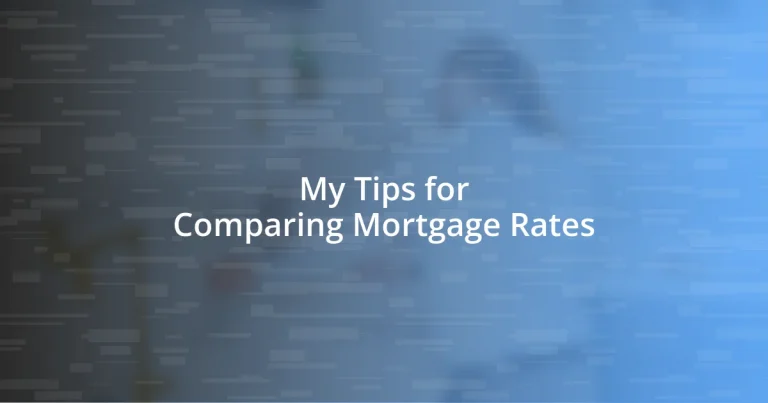Key takeaways not available due to an error.
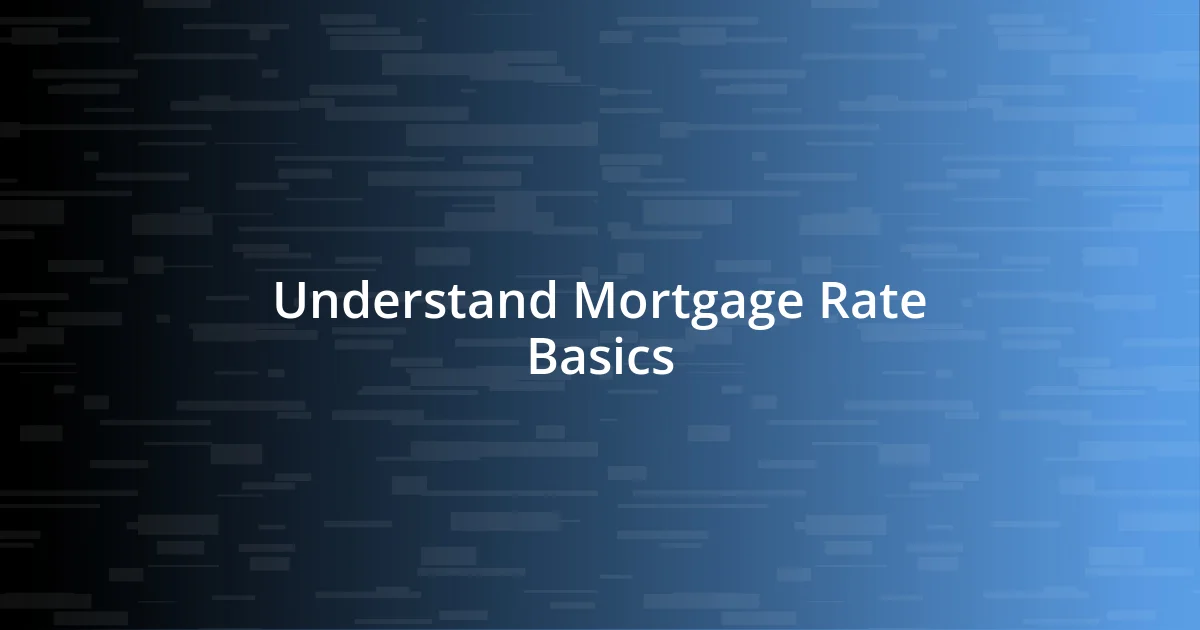
Understand Mortgage Rate Basics
When I first dove into understanding mortgage rates, I was surprised by how much they can vary based on numerous factors, such as credit score, loan type, and market conditions. Have you ever noticed how a small percentage change can dramatically affect your monthly payment? It’s like realizing that a slightly different path can lead to vastly different destinations.
One thing that struck me was how interest rate types play into this. You can choose between fixed rates, which stay the same throughout the loan term, and adjustable rates, which can fluctuate. Reflecting on my own experience, I remember the anxious feeling of weighing the stability of a fixed rate versus the potential short-term savings of an adjustable one; it felt like trying to predict the weather in an uncertain forecast.
Additionally, understanding the concept of APR (Annual Percentage Rate) became a game-changer for me. It captures not just the interest rate but also any additional fees involved in securing that mortgage. Is it clear how those hidden costs can creep into your calculations? I learned that paying attention to APR helped me make a more informed decision, ultimately saving me money and peace of mind.
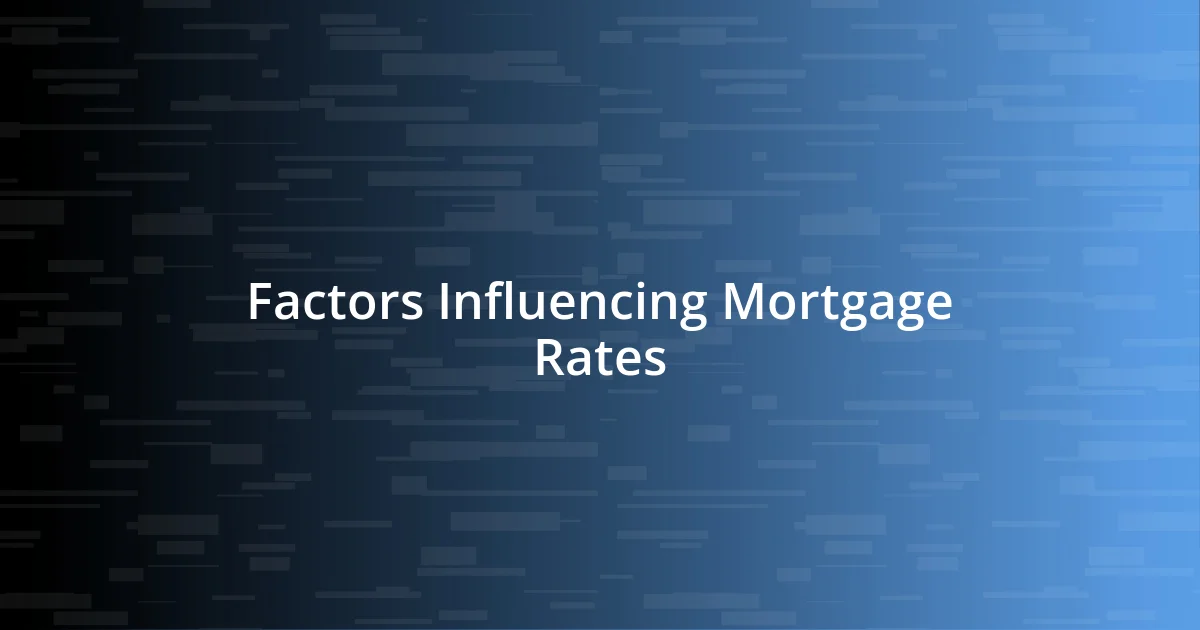
Factors Influencing Mortgage Rates
So, what exactly influences mortgage rates? It’s fascinating how many elements come into play. For instance, I didn’t realize that your credit score can significantly impact the rate you qualify for. When I was shopping for my first mortgage, I remember the thrill of seeing how improving my score by just a few points opened up better options. It’s like having a key that unlocks doors to more favorable terms.
Here’s a quick rundown of some key factors that can sway mortgage rates:
- Credit Score: A higher score generally leads to lower rates.
- Loan Type: Different types of loans, like FHA or VA, come with varying rates.
- Down Payment: A larger down payment often results in a better interest rate.
- Economic Factors: Inflation, the job market, and the overall economy can influence rates.
- Lender Policies: Different lenders have their own criteria and pricing strategies.
From my own journey, I can’t emphasize enough how staying informed about these factors empowered me to negotiate better rates. It became clear to me that knowledge is indeed power when it comes to securing a mortgage.
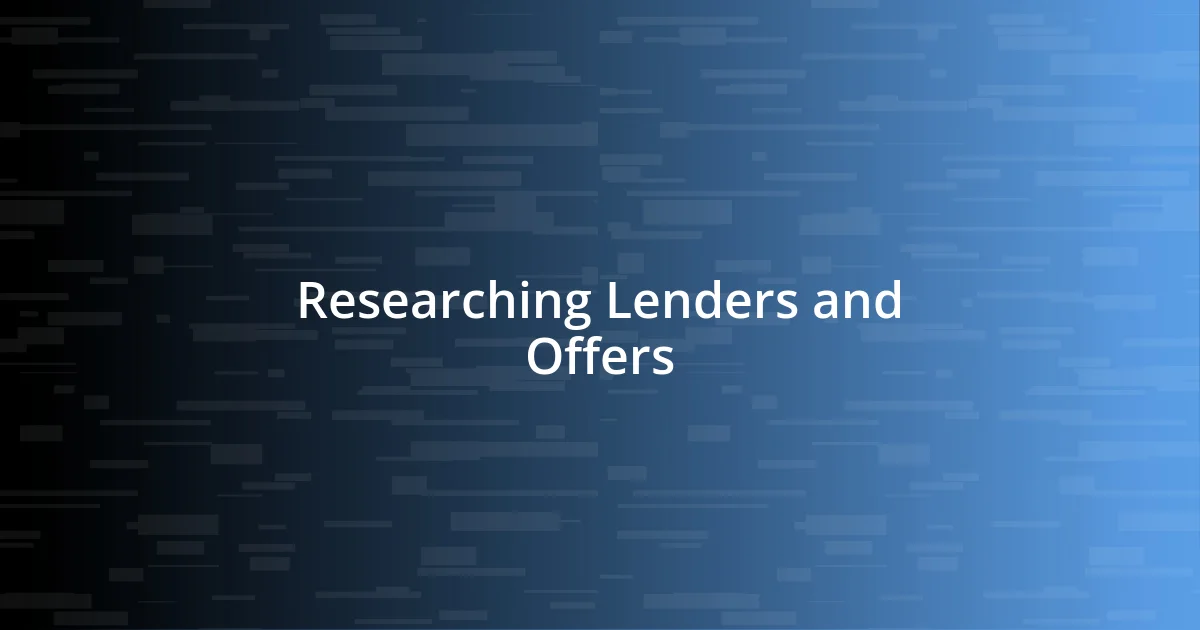
Researching Lenders and Offers
When I set out to research lenders and offers, I quickly realized the wealth of options available. It was like standing at a crossroads, each path representing a different lender with unique offerings. What really helped me was narrowing down my options by comparing key features, such as interest rates, fees, and customer service. Just like choosing a good restaurant, I looked for reviews and recommendations from friends and online sources to glimpse how others experienced their lender’s service.
Incorporating a side-by-side comparison made the process manageable. I created a table to visualize my findings, and suddenly, it all became clearer. Thinking about it now, I remember the excitement of finding a lender that not only offered a competitive rate but also an exceptional reputation. Personal connections can make a huge difference, and I found comfort in knowing that others had positive experiences.
It’s vital to dig deeper than just the headline rates. Some lenders might appear attractive at first glance, but hidden costs can quickly add up. I learned this when I encountered what seemed like an appealing offer that turned out to have hefty closing fees. Being thorough in my research ultimately saved me a significant amount of money, reinforcing how I approached the next stage of my mortgage journey.
| Lender Name | Interest Rate |
|---|---|
| Lender A | 3.5% |
| Lender B | 3.75% |
| Lender C | 3.9% |
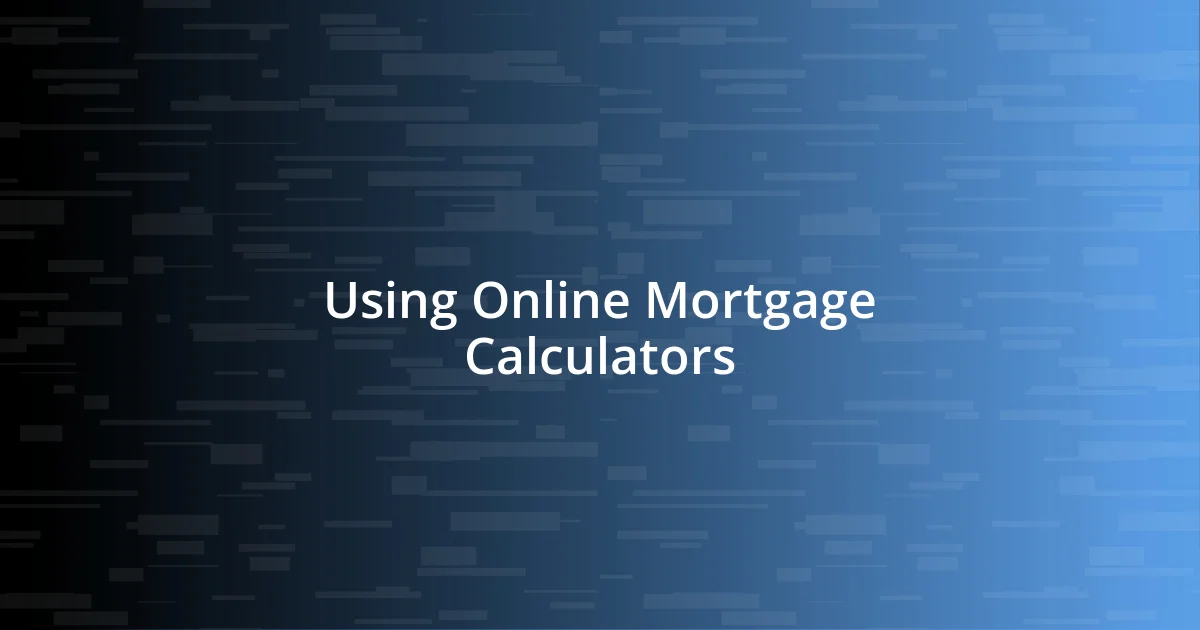
Using Online Mortgage Calculators
Using online mortgage calculators can be a game-changer in your mortgage decision-making process. I still recall the first time I used one; it was almost like magic! I entered my loan amount, interest rate, and term length, and instantly, I visualized what my monthly payments could look like. It helped me grasp the impact of various scenarios, which was incredibly enlightening.
What I found especially useful was the ability to experiment with different inputs. Have you ever wondered how much a one-point difference in your interest rate could affect your budget? I played around with various rates and saw just how much it could change my monthly expenses. It was a real eye-opener, sharpening my focus as I prepared to speak with lenders.
Also, many calculators provide a breakdown of fees and additional costs, which I found essential. When I was ready to make the leap into homeownership, understanding the total cost of the mortgage helped me feel more confident in my financial choices. Now, I always recommend using these tools as a vital first step—it’s like a sneak peek into the future of your financial commitments.
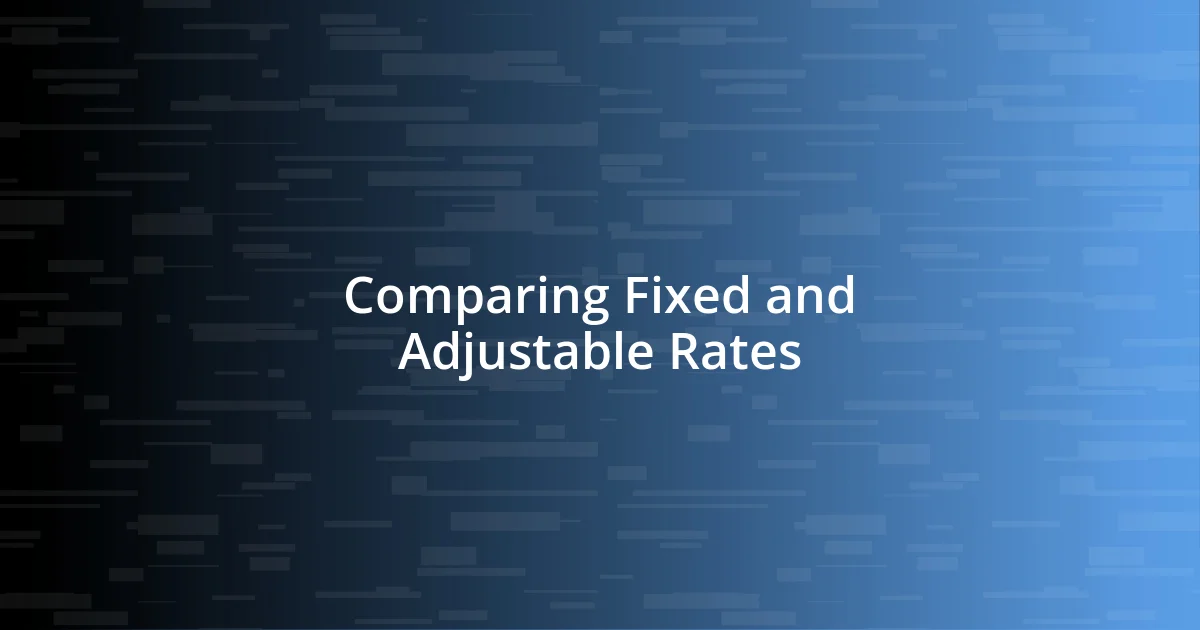
Comparing Fixed and Adjustable Rates
When I was comparing fixed and adjustable rates, I found that each option presents its own unique set of benefits and challenges. I remember sitting at my kitchen table, spreadsheets sprawled out, weighing the stability of a fixed rate against the potential for savings with an adjustable rate. It felt like a gamble—do I opt for predictability or take a chance on lower initial payments?
As I delved into the specifics, I realized that fixed rates offer peace of mind. With these loans, my monthly payments wouldn’t budge, no matter what happened in the market. This certainty brought me comfort, especially during those moments of economic uncertainty; however, I also couldn’t ignore the enticing lower rates of adjustable mortgages that promised flexibility for the first few years. Have you ever asked yourself if you’d feel comfortable with the unknown? For me, the thought of future rate adjustments was both thrilling and nerve-wracking.
In the end, it boiled down to a personal reflection on my financial situation and long-term goals. I once had a friend who took the plunge with an adjustable rate and ended up saving a significant amount initially, but then faced rising payments later on. That experience reminded me how crucial it is to evaluate your risk tolerance and financial planning when deciding between fixed and adjustable rates. What’s your comfort level with potential changes?
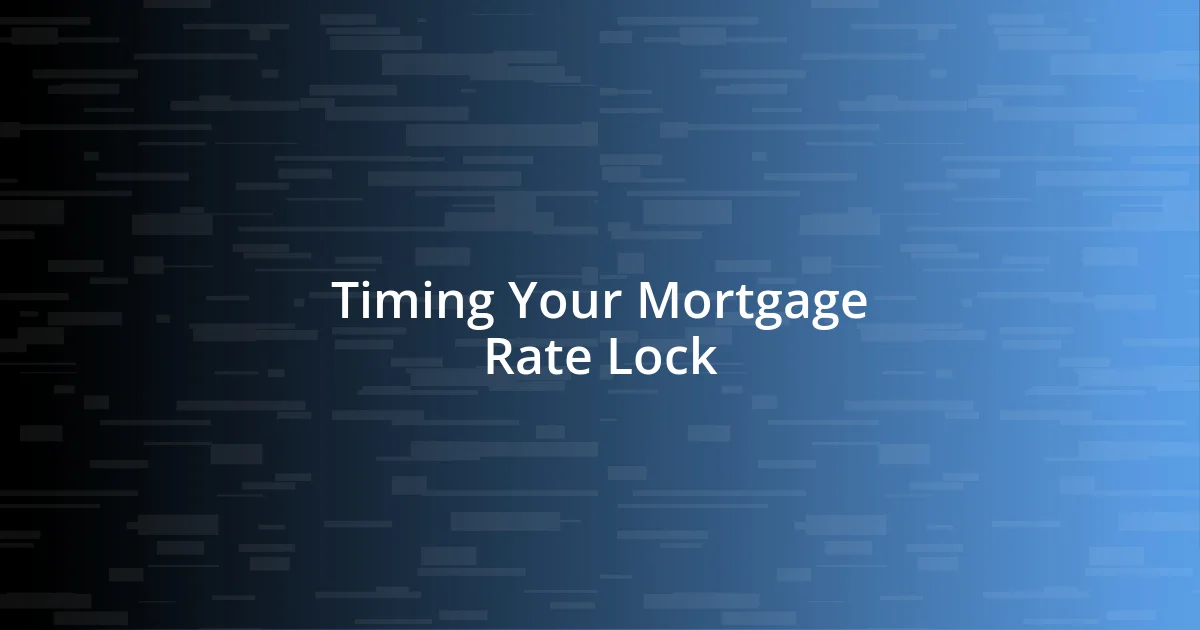
Timing Your Mortgage Rate Lock
Timing your mortgage rate lock can significantly influence your overall mortgage experience. I remember the frenzy I felt when interest rates were fluctuating—one day they seemed perfect, and the next, they shifted. It was a total rush, but with my lender’s guidance, I learned the importance of monitoring market trends. Have you found yourself glued to rate charts, wondering when to make your move?
One particular instance stands out. I was ready to lock in my rate, but I hesitated, thinking it might dip even lower. A wise friend nudged me, reminding me that waiting too long can lead to missed opportunities and unnecessary stress. Locking in at the right moment provided me with a sense of security that was vital for my budgeting. I often think back to that choice—sometimes, seizing the moment is far better than risking a few extra bucks.
It’s essential to keep an eye on economic indicators like employment rates and inflation when timing your lock. These factors play a huge role in interest rate changes. I made it a habit to check the news regularly, which helped me feel more informed and empowered in my decision. Trust me; the right timing could mean all the difference in securing a favorable rate!
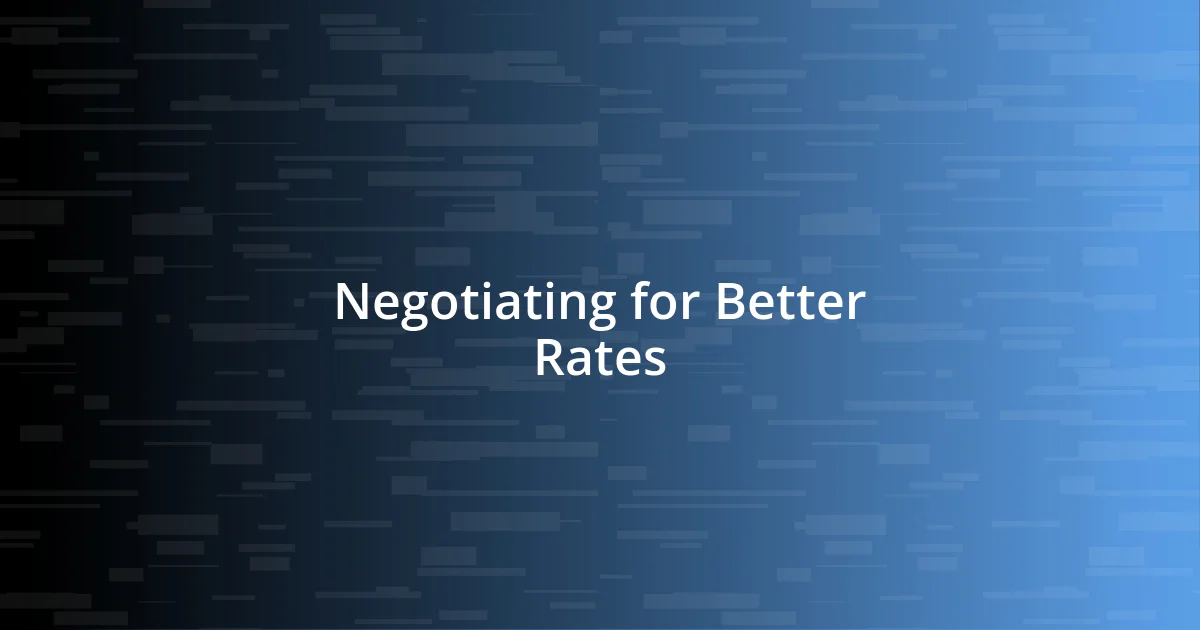
Negotiating for Better Rates
Negotiating for better mortgage rates can truly make a difference in your overall financial health, something I experienced firsthand during my own mortgage process. I vividly recall walking into my lender’s office, feeling a mix of nerves and determination. When I casually mentioned the rates I’d found online, I was surprised when they offered me a lower rate almost immediately. Have you ever tested the waters like that? It was a lightbulb moment for me—I realized that simply asking could lead to better terms.
During my negotiations, I didn’t shy away from discussing competing offers. I remember having a printed comparison of rates from different lenders in hand, ready to advocate for myself. This approach not only showcased my commitment but also created a sense of urgency for the lender to present their best possible deal. I recommend this tactic; you never know how much room there is for negotiation until you put the facts on the table.
One thing that helped me immensely was being open to discussing not just the rate but also the terms of the loan. I found that lenders appreciated buyers who were informed and willing to ask questions. When I inquired about different fees and closing costs, I discovered options for waiving certain charges. It made me feel empowered and, frankly, relieved to know that I had some control over the outcome. Have you taken the time to explore what you can negotiate? Trust me, it can change the entire landscape of your mortgage commitment.












